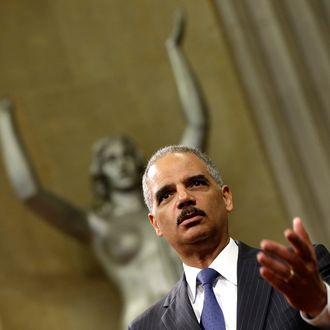
In a speech before the American Bar Association on Monday, Attorney General Eric Holder will announce a major policy shift aimed at reducing mandatory minimum sentences for drug offenses and cutting down the U.S. prison population. “Certain low-level, nonviolent drug offenders who have no ties to large-scale organizations, gangs, or cartels will no longer be charged with offenses that impose draconian mandatory minimum sentences,” Holder will say, according to advance excerpts from his remarks. Federal prosecutors are being instructed to omit the quantities of illegal substances in indictments for lesser drug cases, which will avoid federal laws that impose mandatory minimum sentences and give judges and prosecutors more leeway. “Too many Americans go to too many prisons for far too long and for no good law enforcement reason,” says Holder. “We cannot simply prosecute or incarcerate our way to becoming a safer nation.”
Holder argues that the U.S. should undo some of the strict sentencing laws imposed in the eighties and nineties on both moral and economic grounds. “A vicious cycle of poverty, criminality and incarceration traps too many Americans and weakens too many communities,” he says, noting that while the U.S. only has 5 percent of the world’s population, Americans make up 25 percent of the global prison population. The Justice Department is calling on U.S. attorneys to “develop specific, locally-tailored guidelines” for determining when federal charges should be filed, revising guidelines on releasing elderly non-violent criminals, and looking into increasing community service and drug treatment programs as alternatives to prison.
While at one point those suggestions would have drawn accusations of being soft on crime, as crime rates have dropped in recent years, lawmakers from both parties have been more open to reducing prison populations — with many conservatives swayed by their desire to cut government spending. In an effort to deflect criticism, Holder will back legislation with bipartisan support in Congress that would give federal judges more discretion in sentences for drug offenses. He’ll also point to successful prison reform movements in right-leaning states like Texas and Arkansas. “By reserving the most severe penalties for serious, high-level or violent drug traffickers, we can better promote public safety, deterrence and rehabilitation, while making our expenditures smarter and more productive,” says Holder.






























